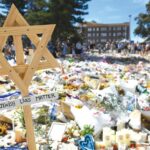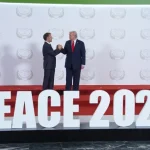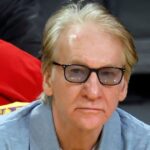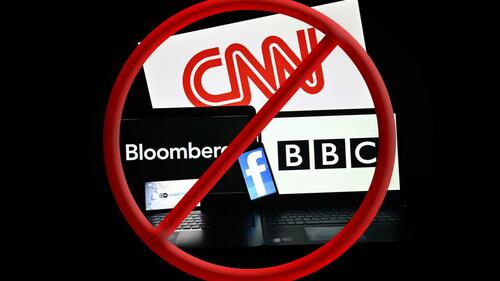
Just days ago, the Russian government moved to ban over 90 journalists and media entities from the country. This came in the wake of the Kremlin opening investigations against American and Italian TV crews, including CNN, for being embedded with the Ukrainian army as it moved into Kursk Oblast.
Last week's published list of blacklisted Americans included Wall Street Journal Editor in Chief Emma Tucker along with eleven current and former WSJ staff members. NY Times journalists were impacted too, with Kyiv Bureau Chief Andrew Kramer showing up on the list, also along with four reporters from The Washington Post.
Russian President Vladimir Putin was asked about matters of press freedoms, and the state of Western media, on his first day in Mongolia where he's attending official events surrounding the anniversary commemoration of the 1939 Soviet-Mongolian victory over Japan in the Battle of Khalkhin Gol. In the backdrop is the The Hague's International Criminal Court (ICC) requesting its member state Mongolia to arrest the Russian leader, but it is refusing. Moscow says this was all worked out ahead of time and won't be a problem.
Putin was interviewed by the Mongolian newspaper Onoodor just before he touched down in the country, and Putin's main message was that the West hides every inconvenient fact while brushing it aside as "propaganda".

He described that the Kremlin's latest moves against major American news outlets are but a justified response to the West previously punishing Russian outlets first.
"Almost all Western countries where our journalists try to work are creating obstacles for them, banning Russian television channels and directly censoring our media and online resources," Putin said, according to translation featured in RT. This obviously "runs counter to the democratic principles of freedom of speech and the free flow of information," he emphasized.
"The West, which claims to be a model of freedom, has opted to hide from inconvenient facts and the truth by launching a blatant bullying campaign against Russian journalists and indiscriminately labeling them as 'Kremlin propagandists,'" he continued.
Back in March 2022, after pressure from the US government which included Washington slapping the channel with a foreign agent label, a slew of major platforms including DirecTV and Roku dropped the channel, resulting in RT America laying off all of its mostly American staff and closing up its four main offices in the US. The European Union also moved against RT as well as Sputnik, and RT was further booted from YouTube.
But the reality was that with the forced retreat of these Russian state media English-language channels, people in the West - whether an academic, a journalist, politician, or individual citizen - could no longer be presented with the Russian perspective. It also became harder to more immediately access Russian statements on any given world event. This was all of course by design. It was yet more of a government enforced narrowing of 'alternative views'.
But Putin claimed that his government keeps a proper balance between press freedoms and issues of national security:
"Our authorities cooperate constructively with television channels, news agencies, newspapers, online media, and other media outlets, regardless of their editorial policy," he said. "The only thing they are required to do is comply with Russian laws. This should be understood by foreign journalists accredited in Russia."
Through those means, Moscow has managed to strike a balance between the freedom of the press and national security, the Russian leader argued.
🇷🇺🇲🇳 Putin has arrived in Mongolia on an official visit.
— DD Geopolitics (@DD_Geopolitics) September 2, 2024
Here is a video of him getting arrested... Oh, wait. Nevermind. pic.twitter.com/9FvbKkEc6t
Putin's reference here is to the CNN crew (and others) who 'illegally' crossed Russian borders in order to film the Ukrainian army's incursion in to Kursk in late August.
The Kremlin at the time said it summoned the US ambassador in "connection to the provocative actions of American reporters who illegally entered the Kursk region to produce propaganda for covering up the crimes of the Kyiv regime."
Red carpet treatment and full military and ceremonial honors despite the ICC's demand that Mongolia arrest Putin...
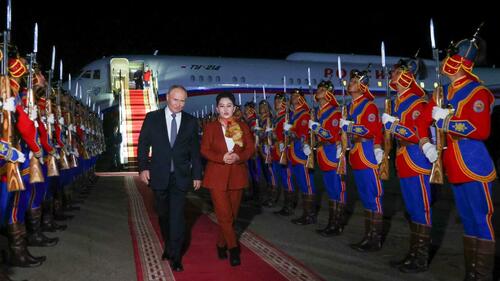
So Putin seems to be saying that the United States would never tolerate if Russian journalists illegally snuck onto American soil, and neither will Russia tolerate the opposite scenario - which is something that actually played out recently.
Just days ago, the Russian government moved to ban over 90 journalists and media entities from the country. This came in the wake of the Kremlin opening investigations against American and Italian TV crews, including CNN, for being embedded with the Ukrainian army as it moved into Kursk Oblast.
Last week’s published list of blacklisted Americans included Wall Street Journal Editor in Chief Emma Tucker along with eleven current and former WSJ staff members. NY Times journalists were impacted too, with Kyiv Bureau Chief Andrew Kramer showing up on the list, also along with four reporters from The Washington Post.
Russian President Vladimir Putin was asked about matters of press freedoms, and the state of Western media, on his first day in Mongolia where he’s attending official events surrounding the anniversary commemoration of the 1939 Soviet-Mongolian victory over Japan in the Battle of Khalkhin Gol. In the backdrop is the The Hague’s International Criminal Court (ICC) requesting its member state Mongolia to arrest the Russian leader, but it is refusing. Moscow says this was all worked out ahead of time and won’t be a problem.
Putin was interviewed by the Mongolian newspaper Onoodor just before he touched down in the country, and Putin’s main message was that the West hides every inconvenient fact while brushing it aside as “propaganda”.

He described that the Kremlin’s latest moves against major American news outlets are but a justified response to the West previously punishing Russian outlets first.
“Almost all Western countries where our journalists try to work are creating obstacles for them, banning Russian television channels and directly censoring our media and online resources,” Putin said, according to translation featured in RT. This obviously “runs counter to the democratic principles of freedom of speech and the free flow of information,” he emphasized.
“The West, which claims to be a model of freedom, has opted to hide from inconvenient facts and the truth by launching a blatant bullying campaign against Russian journalists and indiscriminately labeling them as ‘Kremlin propagandists,’” he continued.
Back in March 2022, after pressure from the US government which included Washington slapping the channel with a foreign agent label, a slew of major platforms including DirecTV and Roku dropped the channel, resulting in RT America laying off all of its mostly American staff and closing up its four main offices in the US. The European Union also moved against RT as well as Sputnik, and RT was further booted from YouTube.
But the reality was that with the forced retreat of these Russian state media English-language channels, people in the West – whether an academic, a journalist, politician, or individual citizen – could no longer be presented with the Russian perspective. It also became harder to more immediately access Russian statements on any given world event. This was all of course by design. It was yet more of a government enforced narrowing of ‘alternative views’.
But Putin claimed that his government keeps a proper balance between press freedoms and issues of national security:
“Our authorities cooperate constructively with television channels, news agencies, newspapers, online media, and other media outlets, regardless of their editorial policy,” he said. “The only thing they are required to do is comply with Russian laws. This should be understood by foreign journalists accredited in Russia.”
Through those means, Moscow has managed to strike a balance between the freedom of the press and national security, the Russian leader argued.
🇷🇺🇲🇳 Putin has arrived in Mongolia on an official visit.
Here is a video of him getting arrested… Oh, wait. Nevermind. pic.twitter.com/9FvbKkEc6t
— DD Geopolitics (@DD_Geopolitics) September 2, 2024
Putin’s reference here is to the CNN crew (and others) who ‘illegally’ crossed Russian borders in order to film the Ukrainian army’s incursion in to Kursk in late August.
The Kremlin at the time said it summoned the US ambassador in “connection to the provocative actions of American reporters who illegally entered the Kursk region to produce propaganda for covering up the crimes of the Kyiv regime.”
Red carpet treatment and full military and ceremonial honors despite the ICC’s demand that Mongolia arrest Putin…

So Putin seems to be saying that the United States would never tolerate if Russian journalists illegally snuck onto American soil, and neither will Russia tolerate the opposite scenario – which is something that actually played out recently.
Loading…


